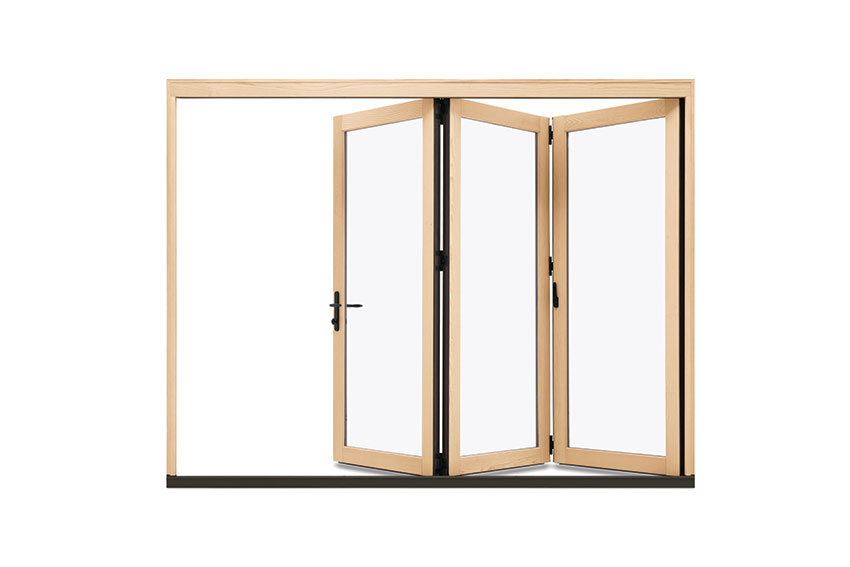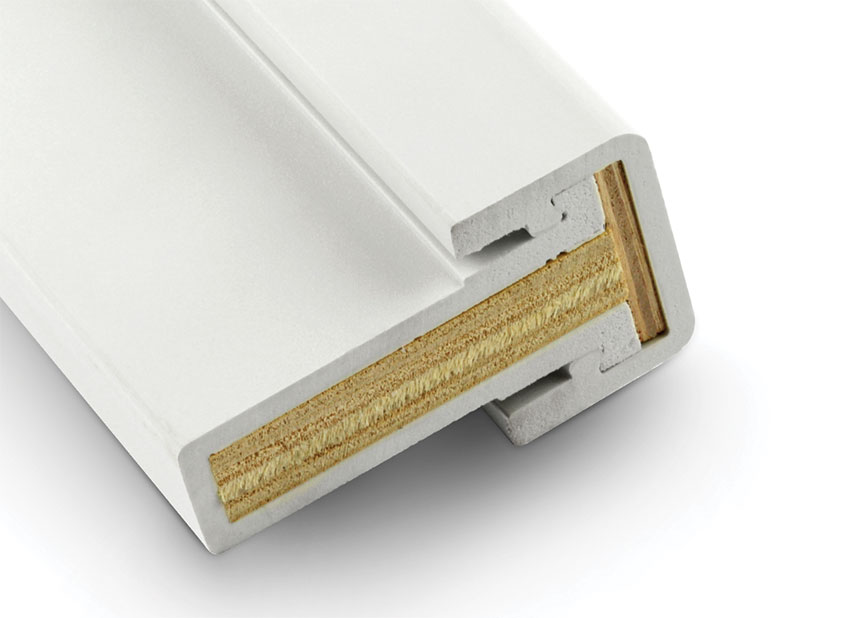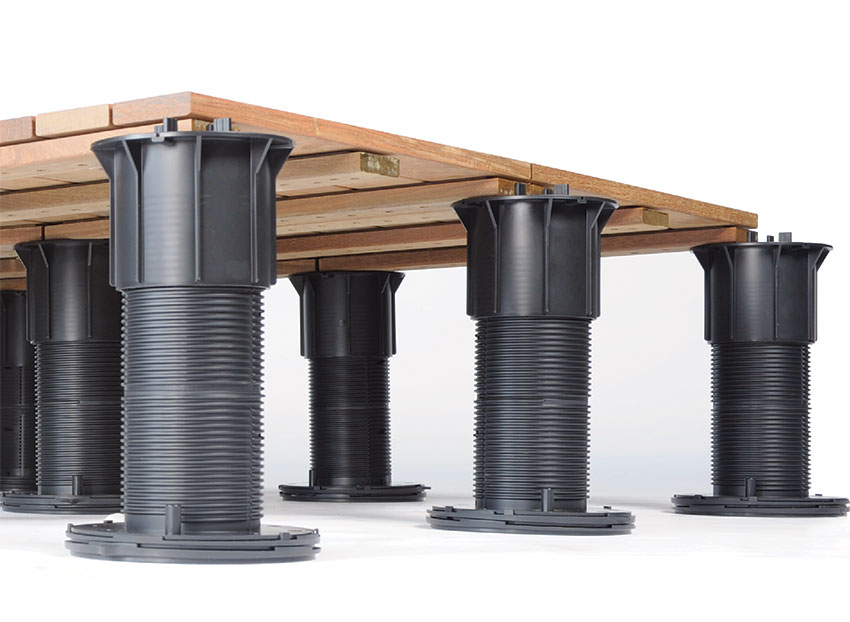This CE Center article is no longer eligible for receiving credits.
RECONNECTING TO OUR NATURAL ECOSYSTEM
Central to emerging residential design trends is the push to reclaim the backyard and unite indoors and outdoors as a single space. Biophilic design principles have steadily risen in popularity in recent years, with an emphasis on creating calming, plant-filled environments that establish a visual connection with nature.8 Experts say that the desire for more natural light and useable outdoor spaces are the most important and essential features for today’s homeowners.9
Modular Flexibility
Outdoor decks connect residents to the physical environment using natural materials, such as wood and stone, and incorporate vegetation and greenery into an individual’s regular routine. Regular interactions with the outdoors are proven to lower blood pressure, reduce stress, expedite healing, and improve a person’s mood and focus.
Selecting a modular deck system provides architects the design flexibility to create unique and beautiful rooftop environments and outdoor spaces and allows homeowners exceptional diversity in creating their space. Design professionals can include a mix of pavers and surface materials including wood, stone, structural porcelain, crushed rock, grating, artificial turf, and concrete, as well as integrated planter cubes and benches, to create unique, custom looks.
Versatile, adjustable pedestal deck systems can be utilized over any structural surface: on bare structural decks, rooftop decks, roof membranes, green roofs, terraces, compacted grade, pavement, pool surrounds, or water features. Modular deck systems offer quick and easy installation. Fastening kits facilitate secure installations of wood tiles and paver-tray-backed pavers without harm to the tiles or pavers. Built-in bottom slope-leveling mechanisms provide pedestal stability and adjustability, even once loaded. Tab sets on each pedestal allow for consistent tile or paver spacing. From utilizing unused space in the city, upgrading a porch or backyard in the suburbs, or creating a luxurious oasis by the sea, rooftop decks can be a solution for a variety of homeowners while also creating valuable outdoor space.

Photo courtesy of Plastpro
When combined with a proprietary foam core, fiberglass doors are among the most energy efficient.

Photo courtesy of Plastpro
Emerging residential design trends emphasize wellness, light, and a better connection to nature, as well as energy efficiency and performance.
Taking Recycled Materials Outside
Biophilic design emphasizes direct interaction with natural materials. Using deck and exterior products that have a modular design for surface materials and accessories allows designers to fulfill an abundance of different design visions without the need for custom or costly materials. Harnessing the power of recycled and certified materials, modular decks bring additional advantages to the table. Offering tremendous design flexibility, coupled with ease of installation, adjustable pedestal deck systems provide a unique and viable alternative to traditional deck building materials and methods.
Leading manufacturers have created wood deck tiles that are commercial grade and available in standard and FSC® Certified options. FSC®-certified wood, used in outdoor decking, comes from forests certified by the Forest Stewardship Council® to meet high global standards for forest sustainability. FSC® certification assures wood products have positive environmental attributes and are backed by a global system of verification. Certain manufacturers are taking outdoor deck materials one step further, engineering planks and tiles from remnants or shorts from other milling operations.
Made from recycled content and fully recyclable at their end of life, sustainable decking products are manufactured in an environmentally sensitive and efficient manner. These systems can help achieve prerequisites and accumulate points in the following categories of LEED: Materials and Resources Credit 4, 6, and 7, in Material Content with Recycled Content, contributions to LEED | SITES points, and Indoor Environmental Quality by using low VOC Sealants and Finishes.
Wood tiles are crafted from premium grade remnants and material harvested in an environmentally responsible method. The material harvesting is designed to preserve the economic viability of rainforest hardwoods. Wood species include fused bamboo, cumaru, garapa, ipê, itauba, and tigerwood. Tropical hardwoods contain a rich variety of graining and coloration, are exceptionally dense, and resistant to insects. These commercial-grade, high density wood species weather well, allowing for minimal maintenance. If maintaining the wood color is desired, wood tiles can be periodically cleaned and sealed. Left to weather naturally, the wood tiles will develop a silvery-gray patina. Weighing one-third as much as concrete tiles, wood tiles are a good alternative when surface material weight is a factor.
When combined with pedestals, wood tiles offer one of the most labor- and cost-efficient methods of creating a flat, level deck over a sloped sub-surface. Manufacturers today offer domestically made pedestals constructed out of high-density polypropylene plastic, comprised of 20 percent post-industrial recycled content, that are also 100 percent recyclable. Pedestal deck support systems are impervious to water, mold, and freeze-thaw cycles. Using a gravity system, the supports protect roofing membranes and waterproofing and do not damage or harm the surface below. Pedestal systems can support decks over occupied space, allowing cavity space for electrical systems, duct work, and irrigation. Deck supports are designed to elevate a variety of substrates, including granite or concrete pavers, wood tiles, composite materials, fiberglass grating, or conventional wood decking systems.
Modular decking naturally accommodates site furnishing, including planters and seating or storage. These modular units are designed to integrate perfectly with modular pavers in a pedestal deck system, making it easy to design a custom, beautiful outdoor environment. Modular cubes can host plant life in the summer and be repurposed for seating and storage in the winter. Lightweight, durable, powder-coated aluminum modular trays expand the design options for rooftop environments. Used as a containment system for architectural rocks or other deck elements, low-clearance trays work with the modular pedestal system to add dimension and texture to deck areas. Incorporating a pedestal system can provide pedestrian access to green roofs. Modular decks installed with a pedestal system provide the opportunity to turn underutilized or wasted outdoor spaces into a functional amenity, extending indoor living space or generating an outdoor oasis of its own.

Photo courtesy of Plastpro
The added insulation core helps to reduce energy consumption and building operation costs by sealing out the elements.
Homes today are tasked with an increasing array of roles: they are a place to relax and reinvigorate, a space to entertain loved ones, a shelter of peace from uncertain times, and a location from which to work and to educate. Home has become not just where we live or sleep, but also where we host events, engage in hobbies, and exercise. Whether designing a new home, or planning for renovations, trends in residential design are demonstrably shifting so that homes can adapt and support these varied needs.

Photo: Detail Homes; courtesy of Bison Innovative Products
Whether building a new home or renovating an existing residence, homeowner “wish lists’’ have shifted significantly in just the past three years. Finishing touches being placed on a modern house in Mississippi.
RENOVATING WITH PURPOSE
The pandemic renewed interest in renovations. From 2019 to 2021, American homeowners undertook some 135 million home improvement projects, spending an estimated $624 billion, according to the most recent American Housing Survey from the U.S. Census Bureau. That is an increase of about $100 billion in home improvement spending over the previous survey period (2017-2019).
Homeowners are also appreciating their existing homes more. Most planned improvements are not targeting potential home buyers. According to a 2022 Home Improvement Report, “Just 20% of homeowners considering home improvements within the next two years say it’s to make their home more attractive to potential buyers. Instead, the most commonly cited reasons include making it more comfortable (54%) and simply feeling more satisfied with it (52%).”1
With people increasingly reporting the desire to improve their current homes, rather than sell, the residential construction market is seeing growth in renovation versus new construction. Homeowners are also beginning to view their homes as a key factor in their own well-being. Beyond simple improvements aimed at how the home functions, renovations are shifting to make changes that improve living situations and provide a sense of control.
The desire for more natural light, a connection to nature, and/or useable outdoor spaces has risen to the top of homeowner priorities. Proprietary and secondary research reveals the quest to capture and transform areas in the home into oases of calm, quiet, and relaxation, a wish that has become increasingly difficult to fulfill as homes are pushed to serve multiple purposes throughout the day.
To connect with the outdoors, homeowner preferences are shifting toward larger expanses of glass in windows and doors when building or renovating. Across the industry, manufacturers report demand for larger glass profiles and an increased focus on energy efficiency. New window products are also catering to this desire. An innovative window product solution creates a glass nook with unparalleled views and natural light, satisfying the desire for biophilic connection and respite─bringing the outdoors in. Surveys of design professionals found that clients are making it a priority to request unbroken views and views that connect them to the natural surroundings.

Photo courtesy of Marvin
Connection to nature through fresh air, light, and views is a major catalyst for home design, whether in renovation or new construction.

Photo courtesy of Marvin
Natural materials and views lead to better wellness.
CAPTURING OUTDOOR SPACES
Just as bringing nature inside is a priority for today’s homes, harnessing usable outdoor areas is very important to homeowners. Functional living spaces have risen to the top of renovation wish lists. Exterior space adds more room for entertainment, exercise, and relaxation.2 Dwelling spaces are also being outsourced to the outdoors: between 2009 and 2019, the number of first-time listings of accessory dwelling units (ADUs) grew on average 8.6% year-over-year, according to a 2020 study released by Freddie Mac.
Outdoor decks are a hallmark way to connect residents to the natural environment through the utilization of natural materials, such as wood and stone. Using deck and exterior products that rely on a modular design for surface materials and accessories allows designers to fulfill an abundance of different design visions without the need for custom or costly materials. Architects can include a mix of pavers and surface materials including wood, stone, structural porcelain, crushed rock, grating, artificial turf, and concrete, with planter cubes and benches, to create unique, custom looks and exceptional diversity in creating a client’s space.
Offering tremendous design flexibility, coupled with ease of installation, adjustable pedestal deck systems provide a unique alternative to traditional deck building materials and methods. Pedestal decks can be used in a variety of spaces: balconies, rooftops, and on-grade applications. Modular decks installed with a pedestal system provide the opportunity to turn underutilized or wasted outdoor spaces into a functional amenity, extending indoor living spaces or generating an outdoor oasis of its own.
Regular interactions with the outdoors have been proven to lower blood pressure, reduce stress, expedite healing, and improve a person’s mood and focus. Modular systems also allow for easy incorporation of vegetation and greenery into the homeowner’s regular routine through the use of integrated planter cubes and pots. Available with standard irrigation sleeves and drainage holes, modular systems can host plant life in the summer and be repurposed for seating and storage in the winter.
By choosing products which rely on modular design, design professionals can easily create an abundance of different design visions without the need for custom or costly materials. These deck materials can adapt to accommodate any project’s specific and particular needs and wants.

Photo courtesy of Plastpro
Door manufacturers are offering innovative materials, like fiberglass, that provide the look clients desire while also satisfying the demand for heightened performance.
QUALITY MATERIALS MATTER
While homeowners are prioritizing the connection with nature to enhance health, they also are increasingly aware of wellness and energy use within their homes. This trend is reflected in the number of homeowners who report a planned investment in better thermal insulation and an energy efficient HVAC system as a renovation priority. Having improved thermal insulation was considered as ‘very important’ for homeowners by 43% of industry experts surveyed.3 “Wellness features, driven by the COVID-19 pandemic and an elevated awareness of the indoor environment’s impact on physical and mental health, are no longer a luxury, but rather a necessity in today’s homes,” reports Dr. Jie Zhao, Executive Vice President of Delos, a New York-based wellness real estate and technology company.4
A surprising example of this is the exterior door. Since, exterior doors make a dramatic visual impact on a home, they are a frequent target of renovations. Unfortunately, doors also can be one of the home’s worst energy offenders. Traditional door materials, like wood and steel, incur major energy penalties. Due to thermal homeostasis, wood acts to absorb heat and draw it away from the conditioned interior, while steel doors require costly interior insulation to be sufficiently effective.

Photo courtesy of Marvin
The desire for better living at home starts with light, air, and views. Industry-wide, demand for more glass and bigger glass exposures is a dominant trend.
In answer to these problems, and to support the increased interest in energy efficiency and comfort, door manufacturers are offering innovative materials that provide the look clients desire while satisfying the performance requirements they need. One answer is fiberglass. Doors made from fiberglass are weather resistant and do not conduct heat well, so that a fiberglass door acts to keep outside elements from having an impact on the conditioned interior. Doors crafted from fiberglass have a longevity similar to steel doors and are harder to scratch than a steel door. Fiberglass is built to withstand intense conditions for long periods of time with little-to-no maintenance, compared to wooden doors. They can also be finished, sanded, and refinished. Aesthetically, the material can be formed into a number of different shapes to adapt to a client’s desired style, mimicking everything from classic wood mainstays to modern designs. Fiberglass doors offer a green alternative to traditional materials, since they are durable, have a longer lifespan, are energy efficient, and environmentally friendly.
Leading fiberglass door manufacturers have created a proprietary foam core that provides superior insulation for maximum energy performance, complies with the Environmental Protection Agency’s SNAP 20 regulations, and utilizes sustainable alternatives for foam blowing agents. The fiberglass material itself is designed to last for decades, reducing construction waste, and requiring less maintenance than traditional wood doors. This makes fiberglass doors more cost-effective over time.
Fiberglass doors offer a more energy efficient solution for concerned clients and home buyers looking for environmentally friendly and efficient products. Fiberglass creates the ability to fortify a residence at its exterior doors and take clients closer towards their home performance goals.
POST-PANDEMIC RESIDENTIAL DESIGN TRENDS
Whether clients are building from the ground up, or embarking on renovations to an existing space, surveys among design professionals demonstrate that they have a whole new list of demands for their home.
Quality and Wellness
Consumers are becoming very conscious about buying quality products and materials that will last. High quality products, made with timeless design and created to last for many years, are consistently seen as worth the investment.
Coupled with this enhanced emphasis on quality comes a focus on energy efficiency and the longevity and durability of products. For windows and doors, most homeowners report that it is essential or highly desirable to have energy-efficient windows that will hold up and perform as expected through cold winters and hot summers for years to come.
Hand in hand with quality products is the newly prioritized desire for wellness. For clients, the desire for better living at home starts with light, air, and views. Industry-wide, demand for more glass and bigger glass exposures is a dominant trend. Leading manufacturers report an exponential increase in orders for scenic doors and larger expanses of glass, with door panel sizes increasing 10% since 2017. Using windows to help with a home’s energy efficiency, daylighting, and natural ventilation are a client priority. Large patio and scenic doors, made from glass, facilitate the flow between indoor and outdoor space. The integration of indoors with outdoors is another commanding post-pandemic design trend.
The Hybrid Home
The third edition of McKinsey’s American Opportunity Survey provides a unique dataset on how the new, flexible work environment fits into the lives of today’s American workers. McKinsey worked alongside the market-research firm Ipsos to survey 25,000 Americans in spring 2022. The most striking figure to emerge from this research is the number of Americans who reported having the opportunity to work from home at least one day a week: 58 percent. Thirty-five percent of respondents reported having the option to work from home five days a week. McKinsey found these numbers particularly notable because the respondents represented all areas of the country and all kinds of jobs, including not only “white collar” professions, but also those traditionally labeled “blue collar” jobs that might be expected to demand onsite labor.5 When employees are offered the opportunity to work flexibly, 87 percent take it.5
This translates into a realization that the pandemic-induced need for multipurpose rooms is not going anywhere. Not only have homeowners adapted to working from home, they also have become accustomed to the conveniences of working out at home, doing schoolwork, and creating spaces that facilitate hobbies and recreational opportunities.
The trend towards hybrid homes certainly pertains to multiuse spaces; however, it also denotes the fact that increasingly homes are becoming multigenerational. As more elders choose to age at home, and with first-time homebuyers facing steep entry barriers into the housing market, the country is witnessing an increase in multigenerational homes. This shift brings a whole new host of design considerations. The wide diversity of family members under one roof results in needing to meet different schedules and requirements for well-being for each.
To enhance the ability to age in place, products that are durable and low maintenance become essential, easing the duties of home ownership for elderly occupants.
The Personalized Home
Smart technology continues to expand its role in enhancing the home experience. As homes are required to do more, their traditional tasks–as a place to retreat and rest–are increasingly impinged upon.
Sleep is a huge factor in living better. The ability to regulate light at home has a dramatic impact on circadian rhythm. Including skylights in a home’s design allows homeowners to capture more natural light during the day. Pioneering skylights are coupling the desire for increased natural lighting with smart technology to provide tunable LED lighting. This smart skylight window offers built in, tunable lighting that mimics the ideal color temperature of natural light to provide the right light at the right time. The lighting can be customized to aid homeowners in their waking up or winding down cycles. Lighting, venting, and shades can be operated from a wall switch, app, or smart home systems.
Imagine a home that’s flooded with natural light, a home that offers a wealth of immersive and calming views, one that helps its occupants receive the right light at the right time. Envision a home that prioritizes the kind of spaces where people can rest, recharge, or gather with loved ones, a home that encourages occupants to breathe easy. Exploring the possibilities of what a home can be, when its design is inspired by well-being, is the fuel behind post-pandemic design trends.
“The pandemic has transformed our relationship and understanding of the opportunities available to reshape our homes to enhance our everyday quality of life,” says Karen S. Planet, AIA, NCARB, LEED AP BD+C, of RWA Architects, Inc. “One of the most prevalent trends is the desire to blur the boundary between the interior and exterior spaces in our homes. Larger groupings of operable windows and doors are being incorporated into new and existing homes to provide seamless connections to the natural exterior environment. These openings improve the daylight in the rooms, provide fresh air, and extend the natural environment deep into the interior spaces. These trends have greatly increased the demand for multi-sliding and bi-folding doors."

Photo courtesy of Marvin
Homes are harder working than ever. Post-pandemic, they have transformed into schools, workplaces, gyms, gathering places, and peaceful retreats–sometimes hosting all of these functions simultaneously.
ENHANCING PERFORMANCE
Joining with the emphasis on wellness, light, and a better connection to nature is the amplified focus on energy efficiency and performance. No longer just a buzz word, the performance of products is increasingly important to homeowners. A 2022 consumer survey showed that 70% of respondents think it’s important to live in a home with energy-efficient features, meaning that these features are no longer just “nice to have,” they’re a priority for today’s homebuyers.6 A survey from the National Association of Realtors (NAR) revealed that 63 percent of agents and brokers find it valuable to promote energy efficiency in a house listing. Real estate agents report that energy efficiency added $8,246 to a home’s value in 2022, up more than $1600 from 2021.7
Fortifying the home at its exterior door is a necessary step towards that goal. State-of-the-art technology has allowed entry doors to join the list of products that not only bring good looks to the table, but also efficiency. Fiberglass doors utilizing a foam core result in strong and sturdy doors that mimic the look and feel of real wood. The fiberglass reinforced skins provide exceptional durability and resistance to humidity, unlike steel doors, which can delaminate. Wood and steel doors have been a traditional choice in the construction industry, but both come with problems such as rotting, rusting, and weather damage. Fiberglass is not susceptible to weather damage, requires less maintenance, and offers higher performance ratings.
Fiberglass does not conduct heat well, so an entry door made with the material will help keep outside elements from impacting the conditioned interior. There are numerous fiberglass styles to choose from, including woodgrain, mahogany, smooth skin, and fir grain.
Unique frame assembly using composite polyfiber (PF) prevents water from infiltrating the door from all angles. The use of completely composite stiles prevents issues such as rotting, warping, and rusting. Leading fiberglass doors feature a full-length laminated veneer lumber (LVL) block that provides stronger rigidity and complements a range of door locks and hardware to be installed for increased security. Fiberglass doors offer a green alternative as they are durable, have a longer lifespan, are energy efficient, and environmentally friendly. Fiberglass doors are available with 10-year, 25-year, and lifetime warranties. Maintenance and durability benefits of a fiberglass front door are enhanced by correctly installing the door, utilizing weather resistant caulk, and applying weather stripping where necessary.
When combined with a proprietary foam core, fiberglass doors are among the most energy-efficient building products available due to the insulation provided by high density polyurethane foam. This insulation helps to reduce energy consumption and building operation costs by sealing out the elements. As a result, these doors are ENERGY STAR Qualified and provide homeowners with cost savings on electricity bills, increased comfort, and environmental protection.
The National Fenestration Rating Council (NFRC) maintains a database of window and door performance. A door’s energy efficiency can be measured by three different factors. First, a Solar Heat Gain Coefficient (SHGC) is the fraction of solar radiation admitted through a window, door, or skylight, either transmitted directly and/or absorbed, and subsequently released as heat inside a home. The lower the SHGC, the less solar heat it transmits and the greater its shading ability. The desirable coefficient depends on where the project is located. In warmer climates, a lower solar heat gain coefficient will help keep the indoors cool, but in cooler climates a higher solar hear gain coefficient can help to keep the home warm through natural insolation. This rating comes in a range of 0-1.
U-factor is the rate at which a window, door, or skylight transmits non-solar heat flow. For windows, skylights, and glass doors, a U-factor may refer to just the glass or glazing alone. Lower numbers equal better performance, with the range being 0-2. Leading fiberglass entry doors with glazing are capable of achieving U-factors as low as 0.20.
Finally, R-values measure a product’s resistance to heat loss. Look for a higher R-Value for a more energy efficient product.
To get the best ratings, the design professional should consider the amount of glass the door has as well as the emissivity of the glass. The U-Factor Rating is affected by the airflow around the window and the emissivity of the glass. Glass with a low emissivity coating is a good option. Emissivity coatings reduce the amount of solar radiation that enters a building from the infrared portion of the solar (sun’s) spectrum while still allowing a high degree of light to come into the building. The coating also helps to keep heat in a building during winter heating periods.
Leading fiberglass door manufacturers are partnering with Habitat for Humanity in order to create supply high performance fiberglass doors to affordable, green houses for low-income families across the nation.

Photo courtesy of Marvin
Skylights increasingly play a part in home design. Smart skylights can help in establishing circadian rhythms indoors.
RECONNECTING TO OUR NATURAL ECOSYSTEM
Central to emerging residential design trends is the push to reclaim the backyard and unite indoors and outdoors as a single space. Biophilic design principles have steadily risen in popularity in recent years, with an emphasis on creating calming, plant-filled environments that establish a visual connection with nature.8 Experts say that the desire for more natural light and useable outdoor spaces are the most important and essential features for today’s homeowners.9
Modular Flexibility
Outdoor decks connect residents to the physical environment using natural materials, such as wood and stone, and incorporate vegetation and greenery into an individual’s regular routine. Regular interactions with the outdoors are proven to lower blood pressure, reduce stress, expedite healing, and improve a person’s mood and focus.
Selecting a modular deck system provides architects the design flexibility to create unique and beautiful rooftop environments and outdoor spaces and allows homeowners exceptional diversity in creating their space. Design professionals can include a mix of pavers and surface materials including wood, stone, structural porcelain, crushed rock, grating, artificial turf, and concrete, as well as integrated planter cubes and benches, to create unique, custom looks.
Versatile, adjustable pedestal deck systems can be utilized over any structural surface: on bare structural decks, rooftop decks, roof membranes, green roofs, terraces, compacted grade, pavement, pool surrounds, or water features. Modular deck systems offer quick and easy installation. Fastening kits facilitate secure installations of wood tiles and paver-tray-backed pavers without harm to the tiles or pavers. Built-in bottom slope-leveling mechanisms provide pedestal stability and adjustability, even once loaded. Tab sets on each pedestal allow for consistent tile or paver spacing. From utilizing unused space in the city, upgrading a porch or backyard in the suburbs, or creating a luxurious oasis by the sea, rooftop decks can be a solution for a variety of homeowners while also creating valuable outdoor space.

Photo courtesy of Plastpro
When combined with a proprietary foam core, fiberglass doors are among the most energy efficient.

Photo courtesy of Plastpro
Emerging residential design trends emphasize wellness, light, and a better connection to nature, as well as energy efficiency and performance.
Taking Recycled Materials Outside
Biophilic design emphasizes direct interaction with natural materials. Using deck and exterior products that have a modular design for surface materials and accessories allows designers to fulfill an abundance of different design visions without the need for custom or costly materials. Harnessing the power of recycled and certified materials, modular decks bring additional advantages to the table. Offering tremendous design flexibility, coupled with ease of installation, adjustable pedestal deck systems provide a unique and viable alternative to traditional deck building materials and methods.
Leading manufacturers have created wood deck tiles that are commercial grade and available in standard and FSC® Certified options. FSC®-certified wood, used in outdoor decking, comes from forests certified by the Forest Stewardship Council® to meet high global standards for forest sustainability. FSC® certification assures wood products have positive environmental attributes and are backed by a global system of verification. Certain manufacturers are taking outdoor deck materials one step further, engineering planks and tiles from remnants or shorts from other milling operations.
Made from recycled content and fully recyclable at their end of life, sustainable decking products are manufactured in an environmentally sensitive and efficient manner. These systems can help achieve prerequisites and accumulate points in the following categories of LEED: Materials and Resources Credit 4, 6, and 7, in Material Content with Recycled Content, contributions to LEED | SITES points, and Indoor Environmental Quality by using low VOC Sealants and Finishes.
Wood tiles are crafted from premium grade remnants and material harvested in an environmentally responsible method. The material harvesting is designed to preserve the economic viability of rainforest hardwoods. Wood species include fused bamboo, cumaru, garapa, ipê, itauba, and tigerwood. Tropical hardwoods contain a rich variety of graining and coloration, are exceptionally dense, and resistant to insects. These commercial-grade, high density wood species weather well, allowing for minimal maintenance. If maintaining the wood color is desired, wood tiles can be periodically cleaned and sealed. Left to weather naturally, the wood tiles will develop a silvery-gray patina. Weighing one-third as much as concrete tiles, wood tiles are a good alternative when surface material weight is a factor.
When combined with pedestals, wood tiles offer one of the most labor- and cost-efficient methods of creating a flat, level deck over a sloped sub-surface. Manufacturers today offer domestically made pedestals constructed out of high-density polypropylene plastic, comprised of 20 percent post-industrial recycled content, that are also 100 percent recyclable. Pedestal deck support systems are impervious to water, mold, and freeze-thaw cycles. Using a gravity system, the supports protect roofing membranes and waterproofing and do not damage or harm the surface below. Pedestal systems can support decks over occupied space, allowing cavity space for electrical systems, duct work, and irrigation. Deck supports are designed to elevate a variety of substrates, including granite or concrete pavers, wood tiles, composite materials, fiberglass grating, or conventional wood decking systems.
Modular decking naturally accommodates site furnishing, including planters and seating or storage. These modular units are designed to integrate perfectly with modular pavers in a pedestal deck system, making it easy to design a custom, beautiful outdoor environment. Modular cubes can host plant life in the summer and be repurposed for seating and storage in the winter. Lightweight, durable, powder-coated aluminum modular trays expand the design options for rooftop environments. Used as a containment system for architectural rocks or other deck elements, low-clearance trays work with the modular pedestal system to add dimension and texture to deck areas. Incorporating a pedestal system can provide pedestrian access to green roofs. Modular decks installed with a pedestal system provide the opportunity to turn underutilized or wasted outdoor spaces into a functional amenity, extending indoor living space or generating an outdoor oasis of its own.

Photo courtesy of Plastpro
The added insulation core helps to reduce energy consumption and building operation costs by sealing out the elements.
Greening the Outdoor Structure
Modular site furnishings allow for simple integration of planters, seating, and storage features. Modular planters made from high strength aluminum or select hardwood come in an array of colors and finishes. These planter cubes are designed to integrate perfectly with modular pavers in a pedestal deck system, making it easy to design a beautiful outdoor environment. Cubes can host plant life in the summer and be repurposed for seating and storage in the winter. Aluminum planter cubes feature an irrigation sleeve and drainage holes. Wood planters feature a polyurethane lining and drainage holes, making plant care and maintenance easy. The adjustable pedestal system creates an ideal solution for water feature applications. The system conceals the water supply beneath the surface materials and allows water to drain to the surface below for recycling. Additionally, the supports are impervious to water, mold, and most chemicals. Pedestal systems can be designed with wind uplift requirements. Wind uplift systems are calculated to resist high-velocity wind zones when installed to the manufacturer’s specifications. Certain manufacturers can provide fire retardant pedestals. Pedestal deck systems also assist in passive solar heating and cooling as their air permeance helps to reduce cooling loads.

Photo courtesy of Plastpro
A seamless integration of indoors and out, to capture outdoor spaces for personal use, is a leading residential design trend. The Frasier House in Boulder, Colorado.
CONCLUSION
As homes leap to adapt to the sweeping shift in how they are lived in, new opportunities for the design professional are also emerging. Design and product innovations are making the future of multipurpose homes not only possible, but also beautiful and energy efficient. These innovations foster the opportunity to establish a better connection with nature, to provide co-generational living in a style that benefits all of the occupants, and to adapt to multiple and shifting demands on how square footage is used. While the definition of home has become more malleable, it has also become much more valuable.
END NOTES
1Nerdwallet, “2022 Home Improvement Report”.
2Experts Reveal Most Important Features for Homeowners in 2022.
3Experts Reveal Most Important Features for Homeowners in 2022.
4https://www.kitchenbathdesign.com/wellness-features-termed-a-necessity/.
5https://www.mckinsey.com/industries/real-estate/our-insights/americans-are-embracing-flexible-work-and-they-want-more-of-it.
6Meritage Homes, Survey methodology: Data is based on a survey conducted in partnership with SWNS and fielded between March 16-21, 2022, among 2,000 men and women between the ages 18-55+.
7https://www.ecowatch.com/energy-efficiency-stats.html.
8https://www.dwell.com/article/interior-design-home-trends-2022-36e4c66b.
998% and 92% “very important” and “important” respectively. "Homebuilder/Architect Survey". August 2022
Amanda Voss, MPP, is an author, editor, and policy analyst. Writing for multiple publications, she has also served as the managing editor for Energy Design Update.
































